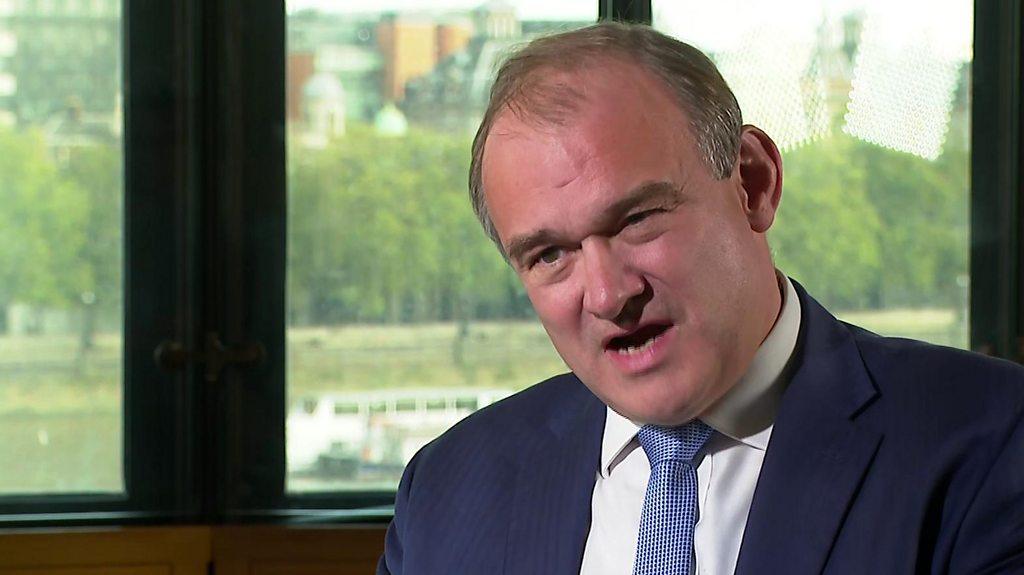Lib Dem leader Ed Davey wants to target Tory heartlands
- Published
- comments
Sir Ed Davey celebrates his party's win in the Chesham and Amersham while breaking down a model blue wall.
As photo opportunities go, knocking down a pile of blue boxes with an orange mallet wasn't exactly subtle.
But that was never the intention.
On the morning of the Liberal Democrats' victory in the Chesham and Amersham by-election in June, leader Sir Ed Davey's stunt demonstrated clearly, if a little clunkily, what his party hoped to achieve.
That was to win votes from Conservative supporters in the party's traditional heartlands, and turn enough bricks in the Tories' blue wall to Lib Dem yellow, to threaten Boris Johnson's grip on power.
In advance of the Lib Dems' conference next month, Sir Ed is embarking on a "blue wall tour" of constituencies which the party is eyeing up for a win.
Beginning in Eastbourne, where they finished second to the Conservatives by 4,331 votes in 2019, he will also take in Wimbledon, where the Lib Dems came a very close second.
Also on the list: Westmorland, which former party leader Tim Farron held with a slim margin, and Harrogate and Knaresborough, where a 9,000 vote majority would need to be overcome.
Party strategists suggest the seats are all similar in demographics to Chesham and Amersham and could be won with just a small swing of support.
The Lib Dems finished second in 91 seats in 2019, and these are where it will focus its efforts in a future general election campaign.
By-election bounce
Speaking to the BBC soon after the by-election upset, Sir Ed said it had "put a smile on people's faces" who were worried about the dominance of Boris Johnson's Conservatives.
Describing it as "a big moment" for his party, the leader cautiously claims its victory in Chesham and Amersham "changed how people are feeling about politics at the moment".
Sir Ed says the win in June showed doubters, even some in his own party, that the Lib Dems should not be written off.
"I think people had questioned whether we could go back to winning ways and now we've shown them we can."
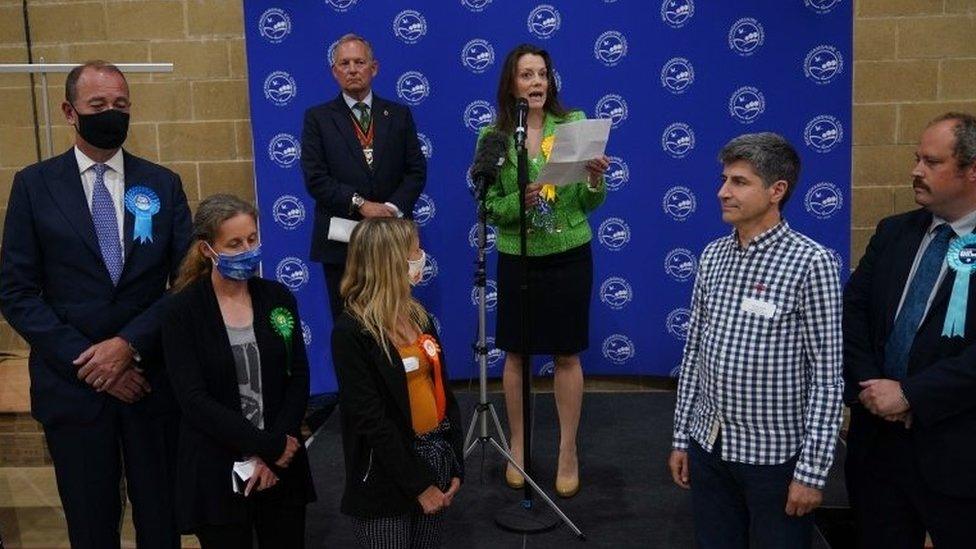
Lib Dem Sarah Green defeated Conservative candidate Peter Fleet (left) overturning a 16,000 Tory majority in Chesham and Amersham
It can't be assumed that the result in Chesham and Amersham will be repeated elsewhere and the Lib Dems are polling at around 9%.
But Sir Ed says the win is proof of the Lib Dem mantra that the only way to remove the Conservatives from power is for his party to take seats from them.
Projections based on by-elections are notoriously unreliable, but that doesn't stop some in the party erring on the side of optimism.
Lisa Smart, chair of the Lib Dems' Federal Communications and Elections Committee, talks of "fundamental change" in British politics if the party can repeat its success in Chesham and Amersham.
"If that swing were replicated at the next general election it would mean many Conservative seats would fall to the Liberal Democrats," she says.
It's a big if.
Credibility gap
Lib Dems need to "show that we are relevant", Sir Ed admits, after the drubbing in the 2015 election it has struggled to recover from.
"The killer thing for the Liberal Democrats has always been about credibility," says Andrew Russell, professor of politics at the University of Liverpool,
Doubt about the party's chances of winning, reputational damage from governing in coalition with the Conservatives and breaking their pledge to abolish tuition fees can combine to hamper the Lib Dems' chances, he argues.
"If you're looking for the reason why the Cleggmania wave didn't quite happen… why capitalising on the 48% remain vote in 2016 wasn't better for the Lib Dems in 2017 or 2019, it was because in far too few seats were they a credible force.
"But even if people are largely sympathetic with the outlook of the party you've still got the wasted vote syndrome of 'can they win here'?"
Some in the party would still like to see the Lib Dems champion rejoining the EU, but there's also a view that a new offering of policies is needed to bridge what Prof Russell calls the "credibility gap".
A policy problem?
Ask Sir Ed how he plans to win voters over and the answers come in broad themes rather than clear cut policies.
But one subject above all stands out as his priority: social care.
"It's fundamental to who I am, in sharp contrast to the prime minister," he says.
His own experience as a young carer for his mother and grandparents and now father of a severely disabled child has given him a unique perspective.
"It's the toughest thing I've done in my life. I don't get a sense from not just Boris Johnson, but this cabinet, this government that they get that."
The party will make what Sir Ed describes as "a major play on values" with the issue and attempt to find support from carers and those who rely on them whom he says feel overlooked.
"It's not a divisive issue, it's an issue that can unite people across income groups, wealth groups and different parts of the country."
Touting his party as "pro-business, pro-enterprise, pro-free trade", Sir Ed also aims to find support among small business owners and the self-employed.
"I think we have an affinity to this extremely large class of small business and self employed people who have been let down by the Conservatives."
And then there's the environment.
His green recovery plan, which he claims would see £150bn investment in transport, energy and infrastructure, is the level of "Biden-esque" ambition needed, Sir Ed suggests.
He accuses the government of "breathtaking" lack of ambition ahead of the COP26 climate conference in Glasgow in November.
"Although we're expecting some documents and policy positions in the run up to Glasgow, there's also huge expectation that they're going to lack the ambition that's needed."
These are all mainstream issues on which the party will compete for support with Labour and the Conservatives, and may struggle to be heard.
But it may also give the Lib Dems a chance to set the agenda, Prof Russell argues.
"There's much more opportunity for the Lib Dems to set an opposition narrative on, say, climate that you could see the main opposition party coming behind."

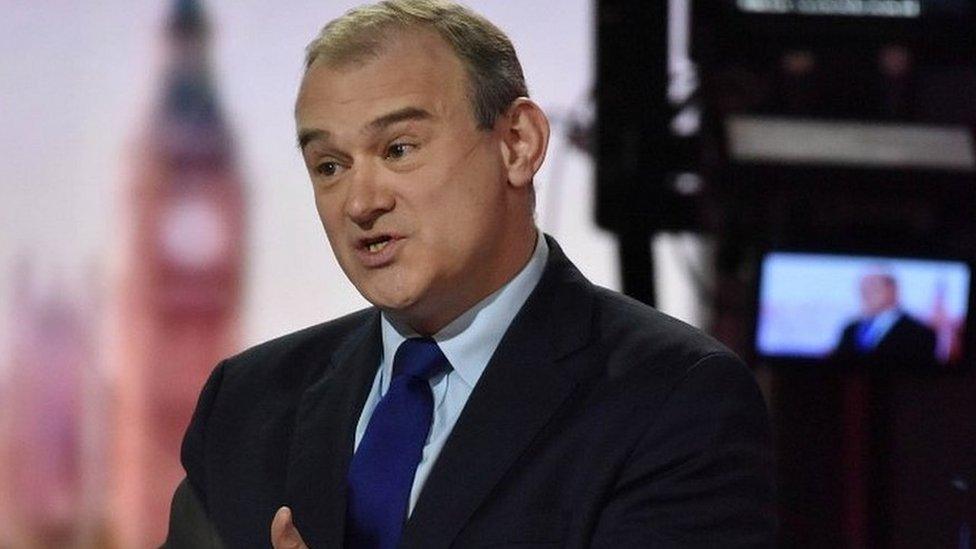
Who is Ed Davey?
Defeated Layla Moran to become leader last August
Energy and climate secretary in the Lib Dem-Tory coalition
Lost both his parents before the age of 15
His wife Emily is a councillor in Kingston, where he is an MP
Cares for his son, who has a rare neurological condition

Labour: help or hindrance?
In contrast to the former Lib Dem leader Jo Swinson's failed attempt to present herself as a candidate for prime minister at the 2019 election, the running theme now is the party's ability to remove the Conservatives from power by unseating Tories in places where Labour can't win.
And Jeremy Corbyn's departure from Labour is arguably as important as anything the Lib Dems might do to win votes themselves.
Sir Ed claims the former Labour leader stalled the party's progress in 2019.
"A lot of people who are with us but for fear of Corbyn couldn't come that extra mile. They're not scared by Starmer, in fact increasingly scared by Johnson and his approach."
"Knocking on doors in 2019, Jeremy Corbyn came up a lot as one reason why some people felt they couldn't risk a vote for us," Lisa Smart explains.
"Because they thought it might let Corbyn in and they didn't want that to happen."
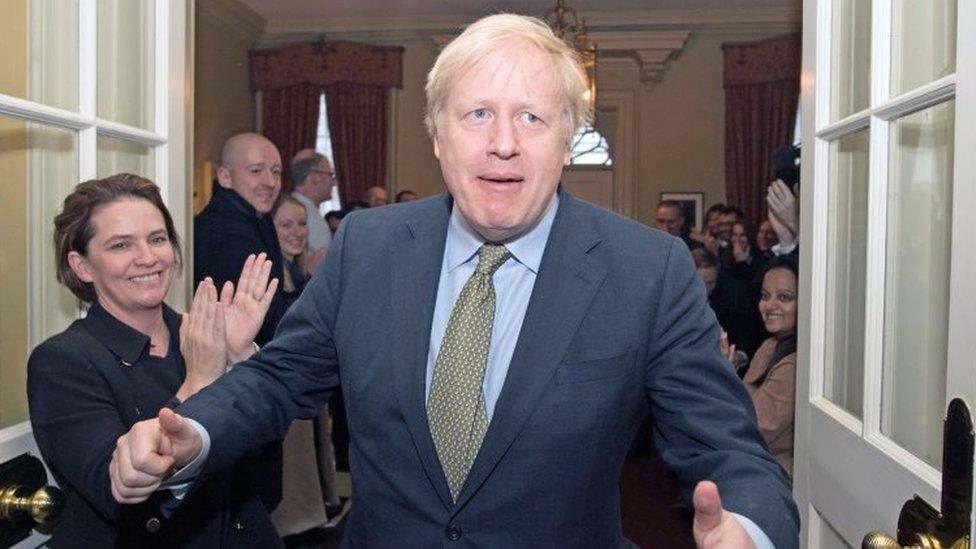
Boris Johnson won the 2019 general election with an increased majority for the Conservatives
Labour's shift back towards the centre under leader Sir Keir Starmer is good news "up to a point" for the Lib Dems, according to Prof Russell.
"The prospect that Liberal Democrats could be king makers who can put Labour in or put the Tories in is better news for them if the prospect of putting either side in is not absolutely abhorrent."
Some Lib Dems express frustration in private at the lack of willingness by many in Labour to accept the smaller party's potential role in removing the Conservatives from office.
Winning here?
From the margins of British politics, the Liberal Democrats are starting at a very low base and face a struggle to prove themselves as a credible alternative to Labour or the Conservatives.
If the party were to even double their number of MPs in parliament at the next election, the result would not in itself be enough to dent Boris Johnson's majority in any meaningful way.
But were it to be combined with a resurgence of support for Labour, the Conservatives' dominance would be under threat.
That will take far more than a few bricks in the blue wall turning yellow, so what are the party's ambitions for the next election, when it comes?
Lisa Smart says: "We will be looking to grow our parliamentary party and we're hopeful we'll have many, many more liberal voices in the Commons."
Related topics
- Published19 June 2021
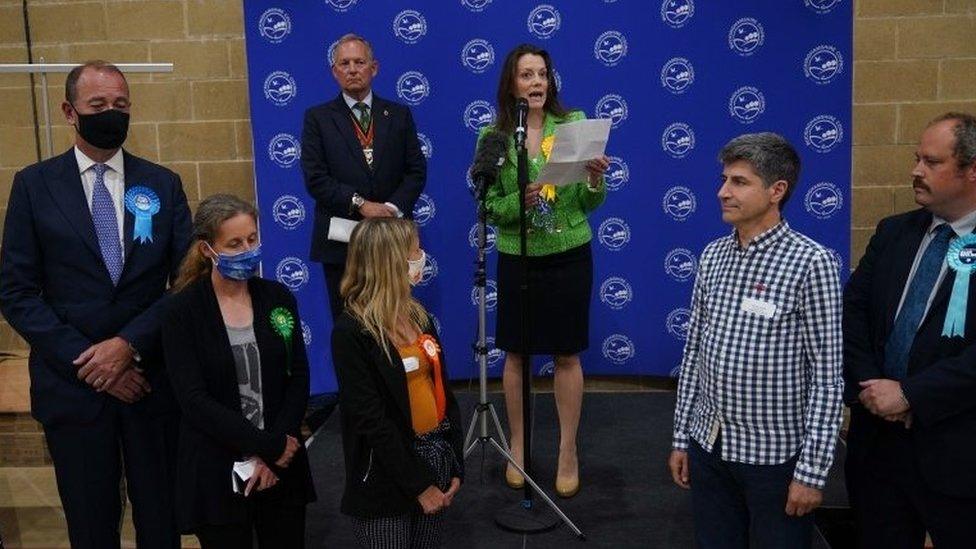
- Published7 February 2021
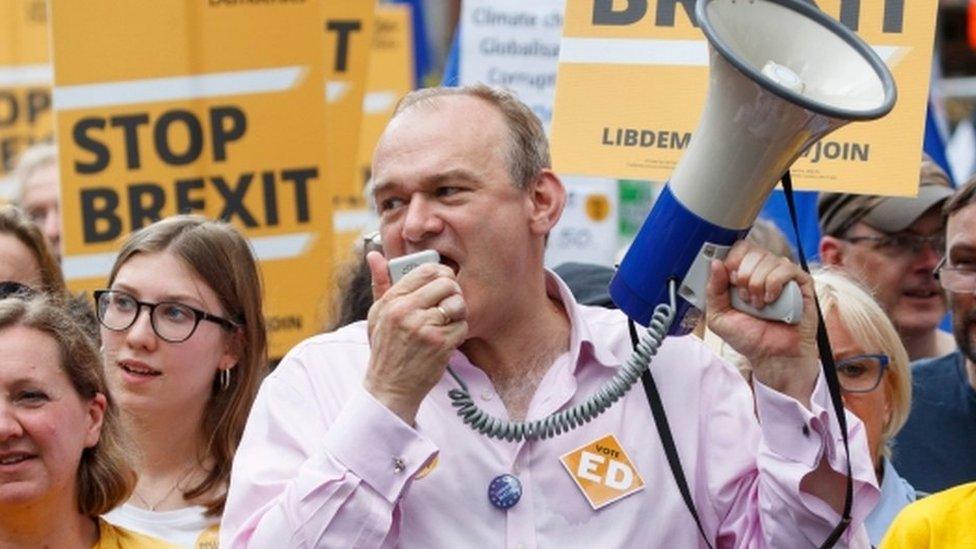
- Published26 December 2020
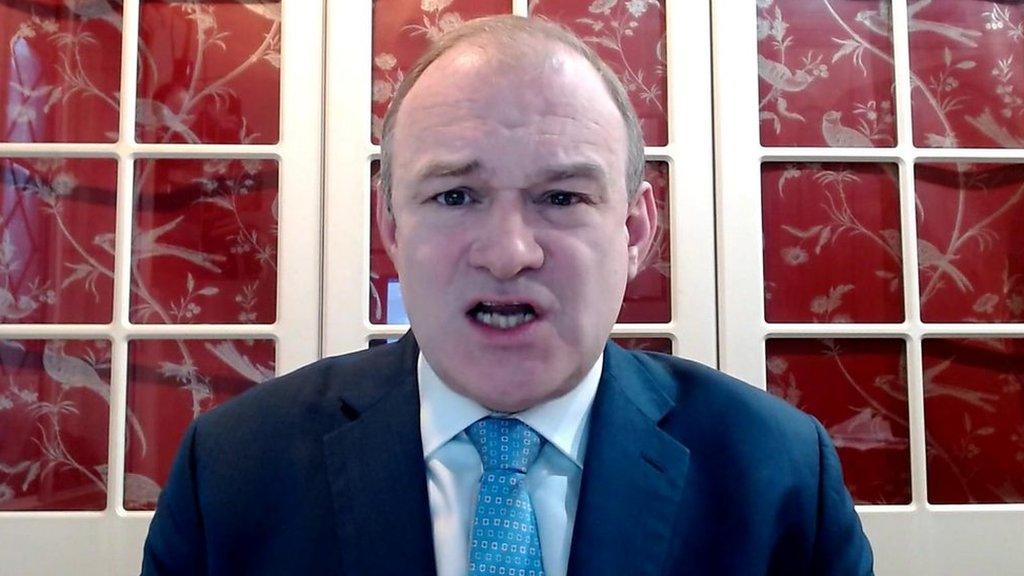
- Published26 September 2023
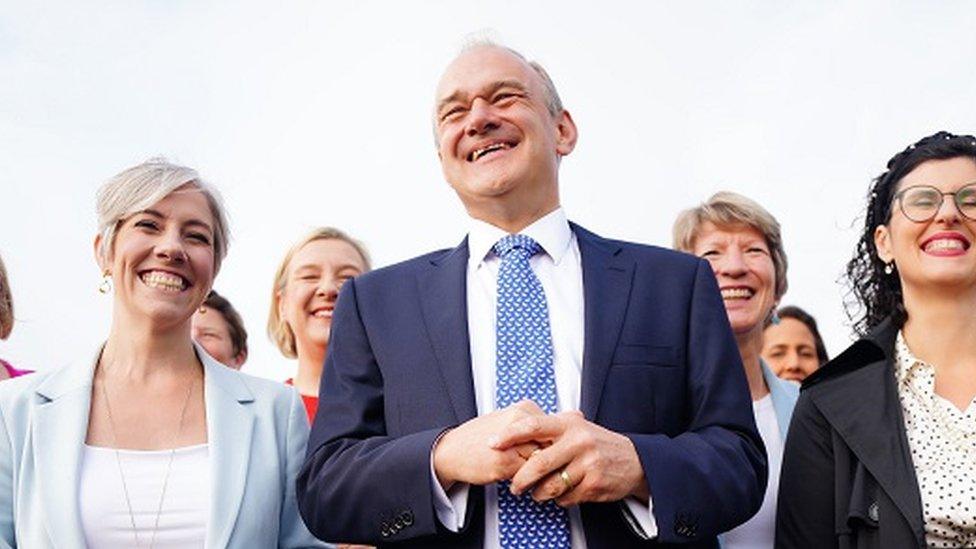
- Published28 September 2020
